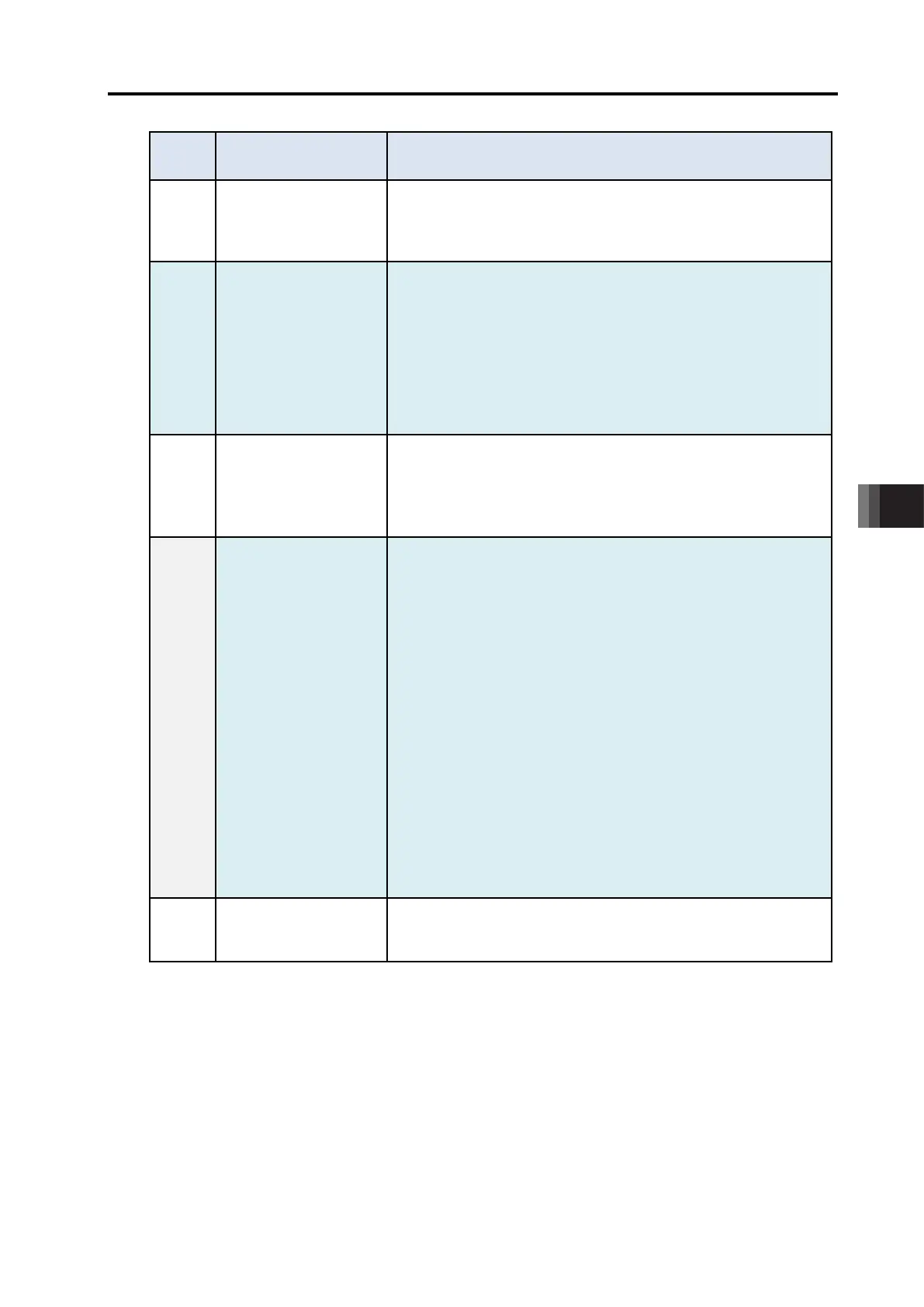8. Troubleshooting
8.3 About Alarms
8-19 ME0342-4B
Cause : It indicates 2s has passed without making a move since a
move command was received.
1) Connection error or wire breakage of motor/encoder
cables.
2) Brake is not released (when equipped with a brake).
3) Load to the motor is high due to external force.
4) The resistance in the actuator sliding operation is large.
Countermeasure : 1) Check for the motor/encoder cable wiring
condition.
2) Supply 24V DC 150mA to the BKRLS terminal
on the power supply connector and if you can
see an improvement, it is considered the
controller failure.
3) Confirm that there is no error in the mechanical
part assembly condition.
4) If the loaded weight is within the allowable
range, turn the power OFF and check the
resistance in sliding operation by moving the
0CE Drop in control supply
voltage
Cause : The control power voltage dropped less than the voltage drop
threshold 16.8V (70% of 24V DC).
1) The voltage of 24V DC power supply is low.
2) A faulty part inside the controller.
Countermeasure : 1) Check if 24V DC +/-10% voltage is applied to
the controller power supply input part (between
24V and 0V of the power supply connector). If
the voltage is low, the 24V DC power supply
may have failed. The current amperage
necessary for the actuator operation is not
secured. Check the necessary current
amperage in the instruction manual, and replace
2) Replace the controller.
Cause : Error detected on heatsink fan inside the controller.
It can be considered the end of fan life. Replace the
fan. Refer to [7.4.2 How to Replace Fan Unit]
Cause : This alarm indicates that the position deviation counter has
overflowed.
1) The speed dropped or the actuator stopped due to the
effect of external force or overload.
2) The excited-phase detection operation following the power-
on is unstable.
Countermeasure : 1) This error occurs when the actuator cannot be
operated as it is commanded. Check the load
conditions such as if the work is touching to the
surrounding object, or brake is properly
released, and remove the cause.
2) Overload can be concerned. Revise the
transportable weight and redo the home-return
8.3 About Alarms
ME0342-4B 8-20
Alarm Name Alarm Name
exceeded
Cause : The current position of the actuator exceeds the software
stroke limit.
Countermeasure : Return the actuator to be within the range of the
0DC Pressing motion range
over error
Cause : 1) After the pressing operation has complete, the force to
push back is too large and the pushed back to the pressing
start position (“Position” in the position table).
2) The actuator touched the work during the approach
movement before the pressing movement.
Countermeasure : 1) Revise the setting and adjust it so the force to
push back gets smaller.
2) Set the “Position” setting in front in the position
table to shorten the approach distance.
Cause : Collision of actuator was detected.
Countermeasure : Remove the cause of collision.
If it is an unexpected detection, re-adjust the
collision detection feature. Refer to [5.1 Collision
CBP
limited
Loadcell Calibration Error
Cause : 1) The calibration command was issued while an actuator is
in operation, during cause or during pressing operation.
2) A calibration error has occurred during calibration
command.
3) The calibration command signal CLBR has turned off
before the calibration was complete.
4) The pressing command was issued without having a
calibration.
Countermeasure : 1) Have a calibration conducted while an actuator
is stopped.
2) Check if there is any large load applied on the
loadcell due to such reason as biting. Also, there
is a concern of noise influence. Check if there is
a source of noise nearby.
3) 4) Check the sequence in either case. Also, there
is a concern of a malfunction of the loadcell.
Replace the loadcell. Refer to [Pulse Pressing
Instruction Manual (ME3807)] for how to replace
detection 1
Cause : The present position changed while reading or saving
absolute data.
Countermeasure : Do not apply vibration to the actuator.
